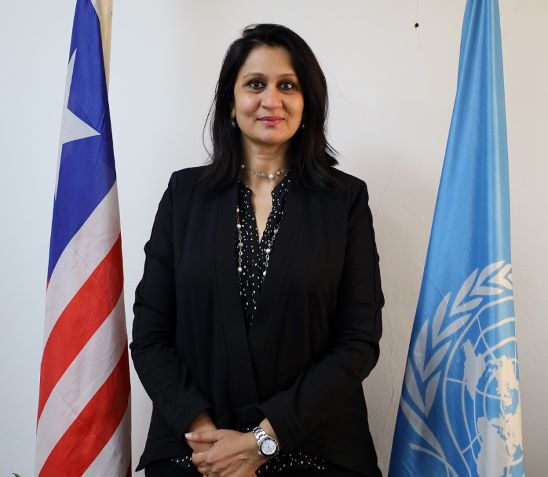Opinion editorial by Bidisha Pillai, Resident Representative, United Nations Population Fund (UNFPA)
Monday, May 02, 2023
On November 15, 2022, the global population reached 8 billion. This milestone presents a moment of reflection, a time for all countries to take stock and drive action, no matter the direction of their population growth.
Coincidentally, Liberia conducted its 5th National Population and Housing Census just at the time the world was hitting 8 billion. With the provisional results released in February 2023, Liberia’s contribution to the global population is 5.2 million. This figure represents a 51 percent increase in the country’s population compared to the 2008 Census (3.4 million). The intercensal growth rate is 3.0 using the geometric growth rate computation, which is an increase of 0.9 from the 2008 growth rate of 2.1.
Conventionally, an increase or reduction in the size and composition of the population is brought about by an interaction of three demographic factors: fertility, mortality, and migration into or out of a given area. Based on the current growth rate, the population of Liberia would double the 2022 figure in 23 years, i.e., by 2046, if the observed annual growth rate of 3.0 percent continues.
It can be said that this is a relatively short period within which the capacity to provide all public goods and services must at least double if the country desires a better standard of living and service provision for the population.
Internal migration, especially rural-urban migration, plays a significant role in the growth of the sub-national population. The provisional results of the 2022 census enumeration also show that nearly 52 percent of the population resides in urban areas. Compared to the 2008 National Population and Housing Census, the proportion of the urban population grew by almost 5 percent (from 47 percent in 2008).
Overall, the world reaches and exceeds 8 billion people at a moment of overlapping and escalating crises, from the COVID-19 pandemic to the dawning climate catastrophe and historic levels of mass displacement. Weakened economies, conflict, and food and energy shortages pose threats everywhere.
On the home front, just as the provisional results of the 2022 Census were being released, there were questions regarding the representativeness and inclusiveness of the data. Amid these concerns, it is all too easy to look at just the number– 5.2 million people in Liberia.
Many valid and pressing concerns are related to population, such as food security, infrastructure, health, and young people’s education and economic empowerment. But when we treat populations as problems rather than people, we obscure the fundamental issues we must address.
UNFPA, the United Nations Population Fund, released this year’s State of the World Population Report on April 19, 2023, calling for countries to rethink how they address changing demographics. The landmark report “8 Billion Lives, Infinite Possibilities: the case for rights and choices” calls for a radical rethink of how population numbers are framed – urging politicians and the media to abandon overblown narratives about population booms and busts. Instead of asking how fast people are reproducing, leaders should ask whether individuals, especially women, are able to freely make their own reproductive choices – a question whose answer, too often, is no.
Societies can become more resilient with policies that support sustainable development and human rights, by empowering individuals to realize their own reproductive ideals and broader well-being. Because, in the end, how we see the world’s population is, quite literally, how we see ourselves. Who are we? Who do we want to be? The future of humanity can be one of infinite possibilities; the choice belongs to us.
Advancing gender equality is the best tool for managing population change and building resilient societies. We must safeguard their right to sexual and reproductive health and make needed investments to realise their full social and economic potential. As we unlock women’s potential by empowering them to make choices about their bodies and lives, they and their families thrive – and their societies – thrive as well.

